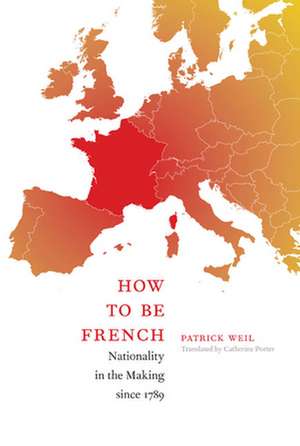How to Be French – Nationality in the Making since 1789
Autor Patrick Weil, Catherine Porteren Limba Engleză Paperback – 14 dec 2008
Preț: 307.95 lei
Nou
Puncte Express: 462
Preț estimativ în valută:
58.92€ • 61.53$ • 48.66£
58.92€ • 61.53$ • 48.66£
Carte tipărită la comandă
Livrare economică 15-29 aprilie
Preluare comenzi: 021 569.72.76
Specificații
ISBN-13: 9780822343318
ISBN-10: 0822343312
Pagini: 456
Dimensiuni: 176 x 225 x 29 mm
Greutate: 0.66 kg
Editura: MD – Duke University Press
ISBN-10: 0822343312
Pagini: 456
Dimensiuni: 176 x 225 x 29 mm
Greutate: 0.66 kg
Editura: MD – Duke University Press
Cuprins
Acronyms and Abbreviations vii
Acknowledgments xi
Introduction 1
Part One. The Construction of Modern Nationality Law in France
1. From the Old Regime to the Civil Code: The Two Revolutions in French Nationality 11
2. The Triumph of Jus Soli (1803-1889) 30
3. Naturalization Comes to the Aid of the Nation (1889-1940) 54
Part Two. Ethnic Crises in French Nationality
4. Vichy: A Racist and Anti-Semitic Nationality Policy 87
5. The Difficult Reestablishment of Republican Legislation 125
6. The Algerian Crisis in French Nationality 152
Conclusion to Parts One and Two 168
Part Three. Nationality in Comparison and In Practice
7. Jus Soli versus Jus Sanguinis: The False Opposition between French and German Law 173
8. Discrimination within Nationality Law 194
9. How Does One Become or Remain French? French Nationality in Practice 228
Conclusion 250
Glossary 255
Notes 263
Maps and Documents 375
Bibliography 409
Index 427
Acknowledgments xi
Introduction 1
Part One. The Construction of Modern Nationality Law in France
1. From the Old Regime to the Civil Code: The Two Revolutions in French Nationality 11
2. The Triumph of Jus Soli (1803-1889) 30
3. Naturalization Comes to the Aid of the Nation (1889-1940) 54
Part Two. Ethnic Crises in French Nationality
4. Vichy: A Racist and Anti-Semitic Nationality Policy 87
5. The Difficult Reestablishment of Republican Legislation 125
6. The Algerian Crisis in French Nationality 152
Conclusion to Parts One and Two 168
Part Three. Nationality in Comparison and In Practice
7. Jus Soli versus Jus Sanguinis: The False Opposition between French and German Law 173
8. Discrimination within Nationality Law 194
9. How Does One Become or Remain French? French Nationality in Practice 228
Conclusion 250
Glossary 255
Notes 263
Maps and Documents 375
Bibliography 409
Index 427
Recenzii
How to be French is a critical history of nationality law and politics that illuminates decisive moments in the making of French nationality while making new and sophisticated theoretical claims about the articulations of nationality, the state, and history itself. This is a stupendous achievement by one of the most important French scholars and public intellectuals writing today. Peter Sahlins, author of Unnaturally French: Foreign Citizens in the Old Regime and AfterThis remarkable, award-winning book is sure to be extremely well received by English-language audiences. It provides a detailed, rigorous, chronologically wide, broadly comparative, and fascinating history of French nationality. How to Be French profoundly revises previous knowledge on the topic, and its comparative framework makes it essential reading not only to scholars of France but also to those interested in Germany, the United States, Algeria, and beyond. Eric T. Jennings, author of Curing the Colonizers: Hydrotherapy, Climatology, and French Colonial SpasHow to Be French is a pioneering study of the fabrication of official Frenchness since the Revolution of 1789, marshaling a plethora of fresh evidence and rereading more familiar sources in the service of an original, thoughtful, and provocative analysis. Patrick Weil is the most knowledgeable and insightful student of the institutional and judicial character of the French social tissueof the political construction of cohesion in a land of immigration. He reminds the French of certain jagged truths they would prefer to forget; soberly, he draws lessons of great pertinence to other societies struggling to make multiplicity and heterogeneity work.Steven Laurence Kaplan, Goldwin Smith Professor of European History, Cornell UniversityPatrick Weils exhaustive study explains the legal background to acquiring or losing French nationality...The book is clearly signposted and written and very carefully translated by Catherine Porter...the level of detail will probably make it more attractive to specialists...his dispassionate and scholarly book sheds much needed light on the complex legal aspects of the question of these post-colonial times.-Sian Reynolds, Times Higher Education, 6th March 2009
"How to be French is a critical history of nationality law and politics that illuminates decisive moments in the making of French nationality while making new and sophisticated theoretical claims about the articulations of nationality, the state, and history itself. This is a stupendous achievement by one of the most important French scholars and public intellectuals writing today." Peter Sahlins, author of Unnaturally French: Foreign Citizens in the Old Regime and After "This remarkable, award-winning book is sure to be extremely well received by English-language audiences. It provides a detailed, rigorous, chronologically wide, broadly comparative, and fascinating history of French nationality. How to Be French profoundly revises previous knowledge on the topic, and its comparative framework makes it essential reading not only to scholars of France but also to those interested in Germany, the United States, Algeria, and beyond." Eric T. Jennings, author of Curing the Colonizers: Hydrotherapy, Climatology, and French Colonial Spas "How to Be French is a pioneering study of the fabrication of official 'Frenchness' since the Revolution of 1789, marshaling a plethora of fresh evidence and rereading more familiar sources in the service of an original, thoughtful, and provocative analysis. Patrick Weil is the most knowledgeable and insightful student of the institutional and judicial character of the French social tissue--of the political construction of cohesion in a land of immigration. He reminds the French of certain jagged truths they would prefer to forget; soberly, he draws lessons of great pertinence to other societies struggling to make multiplicity and heterogeneity work."--Steven Laurence Kaplan, Goldwin Smith Professor of European History, Cornell University "Patrick Weil's exhaustive study explains the legal background to acquiring - or losing - French nationality...The book is clearly signposted and written - and very carefully translated by Catherine Porter...the level of detail will probably make it more attractive to specialists...his dispassionate and scholarly book sheds much needed light on the complex legal aspects of the question of these post-colonial times."-Sian Reynolds, Times Higher Education, 6th March 2009 "Patrick Weil has produced and admirable book. He has also written a very important book, one which will serve as the standard work of reference on issues relating to French nationality for some years. His scholarship is a model of clarity and his judgements are never less than wise and well-informed." Jeremy Jennings, University of London
"How to be French is a critical history of nationality law and politics that illuminates decisive moments in the making of French nationality while making new and sophisticated theoretical claims about the articulations of nationality, the state, and history itself. This is a stupendous achievement by one of the most important French scholars and public intellectuals writing today." Peter Sahlins, author of Unnaturally French: Foreign Citizens in the Old Regime and After "This remarkable, award-winning book is sure to be extremely well received by English-language audiences. It provides a detailed, rigorous, chronologically wide, broadly comparative, and fascinating history of French nationality. How to Be French profoundly revises previous knowledge on the topic, and its comparative framework makes it essential reading not only to scholars of France but also to those interested in Germany, the United States, Algeria, and beyond." Eric T. Jennings, author of Curing the Colonizers: Hydrotherapy, Climatology, and French Colonial Spas "How to Be French is a pioneering study of the fabrication of official 'Frenchness' since the Revolution of 1789, marshaling a plethora of fresh evidence and rereading more familiar sources in the service of an original, thoughtful, and provocative analysis. Patrick Weil is the most knowledgeable and insightful student of the institutional and judicial character of the French social tissue--of the political construction of cohesion in a land of immigration. He reminds the French of certain jagged truths they would prefer to forget; soberly, he draws lessons of great pertinence to other societies struggling to make multiplicity and heterogeneity work."--Steven Laurence Kaplan, Goldwin Smith Professor of European History, Cornell University "Patrick Weil's exhaustive study explains the legal background to acquiring - or losing - French nationality...The book is clearly signposted and written - and very carefully translated by Catherine Porter...the level of detail will probably make it more attractive to specialists...his dispassionate and scholarly book sheds much needed light on the complex legal aspects of the question of these post-colonial times."-Sian Reynolds, Times Higher Education, 6th March 2009 "Patrick Weil has produced and admirable book. He has also written a very important book, one which will serve as the standard work of reference on issues relating to French nationality for some years. His scholarship is a model of clarity and his judgements are never less than wise and well-informed." Jeremy Jennings, University of London
Notă biografică
Patrick Weil
Textul de pe ultima copertă
"This remarkable, award-winning book is sure to be extremely well received by English-language audiences. It provides a detailed, rigorous, chronologically wide, broadly comparative, and fascinating history of French nationality. "How to Be French" profoundly revises previous knowledge on the topic, and its comparative framework makes it essential reading not only to scholars of France but also to those interested in Germany, the United States, Algeria, and beyond."-- Eric T. Jennings, author of "Curing the Colonizers: Hydrotherapy, Climatology, and French Colonial Spas"
Descriere
Broadly comparative history of French nationality, from the French Revolution to the present







